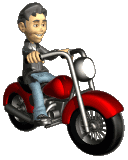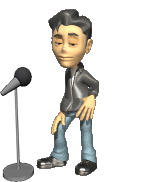Can, Could, be able to (Verbs)


He can ride a bike. But he can't sing!
|
Positive |
I / you / he / she / it / we / you / they can / could go |
|
Negative |
I / you / he / she / it / we / you / they can’t / couldn’t go or cannot / could not go |
|
Questions and Short answers |
Can / Could l / you / he / she / it / we / you / they go? Yes, I can No, he couldn't |

I can cook very well.
I can cook dinner tomorrow.
I can swim.
My brother can speak Russian.
Rabbits can't climb trees.
I can hear the neighbours.
He can't find his keys.
They can smell gas.
Students can use the swimming pool.
You can't talk loudly in the library.
Can I go to the shops, Dad?
Could I borrow this book?
Can I help you?
Could I help you?
Can you help me?
Could you pass the salt, please?
When I was younger I could run very fast.
He could hear the television next door.
I couldn't buy cigarettes until I was sixteen.
She couldn't walk until she was two.
She's unable to understand me. (= She can't understand me.)
He won't be able to visit you next month. (= He can't visit you next month.)
We usually use was/were able to (not could) in the past to talk about something which was difficult to do at a particular time:
I was able to win the race, (net / could win the race.)
She was able to find her passport.
But in the negative, we can use either couldn't or wasn't/weren't able to:
He wasn't able to find his keys. or He couldn't find his keys.
They weren't able to catch the shark, or They couldn't catch the shark.
Julia is at the job agency, looking for a job. Ted, the manager, is interviewing her. Underline all the uses of can and can't.


Ted: Can you drive?
Julia: No, I can't, But my brother can.
Ted: Can you speak any foreign languages?
Julia: No, I can't, but my brother can.
Ted: Can you use a computer?
Julia: No, I can't, but my brother can.
Ted: Can you swim?
Julia: No I can't, but my brother can.
Ted: Can you cook?
Julia: No, I can't, but my brother can.
Ted: (getting angry) Can you add 2 and 2?
Julia: No, I can't, but my brother...
Ted: That's enough, Ms Julia. We can't find you a job. It's impossible. You can't do anything. You're stupid! But we can find your brother a job. He can do everything!
Julia: Well, my brother is the President of your agency. He sent me here to see if you are polite to clients. So you can look for another job now!
Ted wants to find people to do these jobs:
a taxi-driver
a translator in Germany
a chef in an Italian restaurant
a typist
an armed security guard
a photographer
a gardener
a car mechanic
a ski instructor
a journalis
an office worker
a swimming pool lifeguard
Click here for Exercise-1